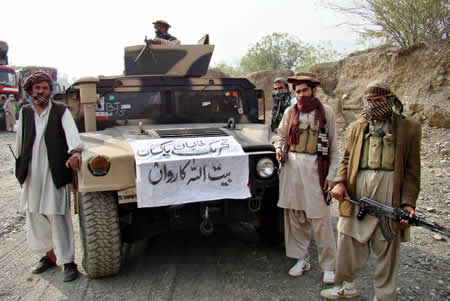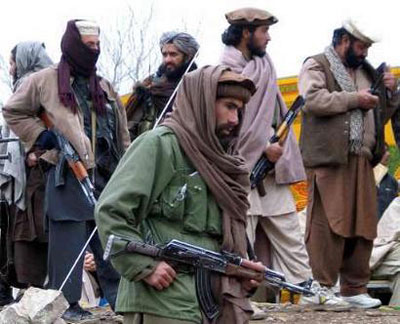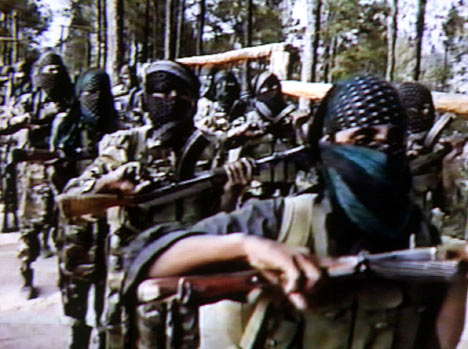 Pakistan A Threat to World Security
Pakistan A Threat to World Security
A stunned Obama administration said on Wednesday that Pakistan posed a "mortal threat" to the United States and world after a rampant Taliban moved to within 60 miles of Islamabad by taking control of Buner district just outside the capital region.
The rapid advance of heavily armed and un-uniformed Taliban towards Pakistan's capital region, home to the country's army (headquartered in nearby Rawalpindi) and much of its nuclear assets (in nearby Kahuta), is sending shock waves across Washington. Administration officials, lawmakers, and South Asia experts are tripping over each other to express grave concern and offer prescriptions to tackle the deteriorating situation.
At a Congressional hearing on US foreign policy priorities, Secretary of State Hillary Clinton reflected some of the urgency and panic when she implicitly blamed the Pakistani government, the army, and civil society for ceding space and territory to the advancing Taliban without a fight.
"Pakistan poses a mortal threat to the security and safety of our country and the world," Clinton said. "And I want to take this occasion ... state unequivocally that not only do the Pakistani government officials, but the Pakistani people and the Pakistani diaspora ... need to speak out forcefully against a policy that is ceding more and more territory to the insurgents ..."
Not enough voices are being heard against the Taliban's progress, she added.
Clinton's blunt remarks are the strongest to come from Washington, where typically, administration officials and regional experts have previously put their trust in Islamabad's bonafides and accepted its word that it was fighting terrorism. For the first time, the US is now saying Pakistan is not; and in fact, it is abdicating its responsibility.
President Obama meanwhile invited President Zardari of Pakistan and President Karzai of Afghanistan to Washington to discuss the speedy developments that seems to have stunned Washington. The three-way talks are likely to take place May 7-8.
Also this week, Washington's top general Admiral Mike Mullen, rushed to Islamabad in what is turning out to be a monthly sortie to get a handle on the situation.
In an interview on CNN, Pakistan's ambassador to the US Hussain Haqqani insisted the situation was not so serious and the government in Islamabad was in control of the developments.
Contesting reports about Taliban advancing to within 60 miles of Islamabad, Haqqani split hairs while maintaining US officials were making "factual errors." Islamabad was 60 miles from Buner "as the crow flies" and longer if one took into account that Swat is a isolated valley across mountains, he said. Pakistan's peace deal was also with a movement which supports Taliban and not Taliban itself, he added.
But at the Congressional hearing, Clinton told worried lawmakers that Taliban's advance poses "an existential threat" to Pakistan and urged Pakistanis worldwide to oppose a government policy that is yielding to them.
"(We) cannot underscore the seriousness of the existential threat posed to the state of Pakistan by the continuing advances now within hours of Islamabad that are being made by a loosely confederated group of terrorists and others who are seeking the overthrow of the Pakistani state," Clinton said.
"I don't hear that kind of outrage or concern coming from enough people that would reverberate back within the highest echelons of the civilian and military leadership of Pakistan," she added.
Lawmakers too expressed immense concern over the deteriorating situation amid a stream of stories in the US media from Pakistan even as Iraq has faded into the background.
The House International Relations Committee chairman Howard Berman, a Democrat from California, said that he and several other Congressional colleagues who had just returned from a trip to India and Pakistan were happy at the dramatically improved ties with India, but deeply concerned about the security situation in Pakistan.
"We cannot allow al-Qaida or any other terrorist group that threatens our national security to operate with impunity in the tribal regions (of Pakistan)," Berman said, adding, "Nor can we permit the Pakistani state - and its nuclear arsenal - to be taken over by the Taliban or any other radical groups, or otherwise be destabilised in a manner that could lead to renewed conflict with India."
Clinton assured lawmakers that the US is advancing its relationship with India as part of a wide-ranging diplomatic agenda to meet today's "daunting challenges" topped by the situation in Pakistan and Afghanistan.
The rapid advance of heavily armed and un-uniformed Taliban towards Pakistan's capital region, home to the country's army (headquartered in nearby Rawalpindi) and much of its nuclear assets (in nearby Kahuta), is sending shock waves across Washington. Administration officials, lawmakers, and South Asia experts are tripping over each other to express grave concern and offer prescriptions to tackle the deteriorating situation.
At a Congressional hearing on US foreign policy priorities, Secretary of State Hillary Clinton reflected some of the urgency and panic when she implicitly blamed the Pakistani government, the army, and civil society for ceding space and territory to the advancing Taliban without a fight.
"Pakistan poses a mortal threat to the security and safety of our country and the world," Clinton said. "And I want to take this occasion ... state unequivocally that not only do the Pakistani government officials, but the Pakistani people and the Pakistani diaspora ... need to speak out forcefully against a policy that is ceding more and more territory to the insurgents ..."
Not enough voices are being heard against the Taliban's progress, she added.
Clinton's blunt remarks are the strongest to come from Washington, where typically, administration officials and regional experts have previously put their trust in Islamabad's bonafides and accepted its word that it was fighting terrorism. For the first time, the US is now saying Pakistan is not; and in fact, it is abdicating its responsibility.
President Obama meanwhile invited President Zardari of Pakistan and President Karzai of Afghanistan to Washington to discuss the speedy developments that seems to have stunned Washington. The three-way talks are likely to take place May 7-8.
Also this week, Washington's top general Admiral Mike Mullen, rushed to Islamabad in what is turning out to be a monthly sortie to get a handle on the situation.
In an interview on CNN, Pakistan's ambassador to the US Hussain Haqqani insisted the situation was not so serious and the government in Islamabad was in control of the developments.
Contesting reports about Taliban advancing to within 60 miles of Islamabad, Haqqani split hairs while maintaining US officials were making "factual errors." Islamabad was 60 miles from Buner "as the crow flies" and longer if one took into account that Swat is a isolated valley across mountains, he said. Pakistan's peace deal was also with a movement which supports Taliban and not Taliban itself, he added.
But at the Congressional hearing, Clinton told worried lawmakers that Taliban's advance poses "an existential threat" to Pakistan and urged Pakistanis worldwide to oppose a government policy that is yielding to them.
"(We) cannot underscore the seriousness of the existential threat posed to the state of Pakistan by the continuing advances now within hours of Islamabad that are being made by a loosely confederated group of terrorists and others who are seeking the overthrow of the Pakistani state," Clinton said.
"I don't hear that kind of outrage or concern coming from enough people that would reverberate back within the highest echelons of the civilian and military leadership of Pakistan," she added.
Lawmakers too expressed immense concern over the deteriorating situation amid a stream of stories in the US media from Pakistan even as Iraq has faded into the background.
The House International Relations Committee chairman Howard Berman, a Democrat from California, said that he and several other Congressional colleagues who had just returned from a trip to India and Pakistan were happy at the dramatically improved ties with India, but deeply concerned about the security situation in Pakistan.
"We cannot allow al-Qaida or any other terrorist group that threatens our national security to operate with impunity in the tribal regions (of Pakistan)," Berman said, adding, "Nor can we permit the Pakistani state - and its nuclear arsenal - to be taken over by the Taliban or any other radical groups, or otherwise be destabilised in a manner that could lead to renewed conflict with India."
Clinton assured lawmakers that the US is advancing its relationship with India as part of a wide-ranging diplomatic agenda to meet today's "daunting challenges" topped by the situation in Pakistan and Afghanistan.









